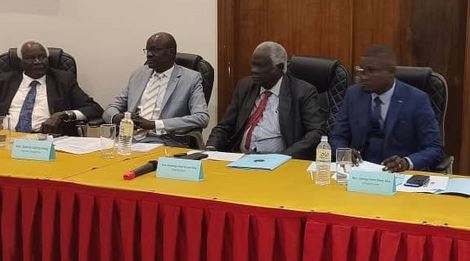The National Elections Commission (NEC) of South Sudan has outlined key priorities to ensure credible elections in 2026, calling for urgent political decisions, legal framework reviews, and enhanced voter education.
Speaking at the launch of the new NEC website on Wednesday in Juba, Gabriel Deng, the Deputy Chairperson of the NEC, underscored the platform’s role in improving communication with stakeholders such as the public, media, and political parties. The event was organized and supported by the United Nations Integrated Electoral Assistance Team (UNIEAT).
“This platform allows us to engage more effectively and provide updates on the electoral process,” he said.
Deng, emphasized the importance of tackling structural and logistical challenges, highlighting the adoption of three codes of conduct aimed at promoting transparency and ethical practices.
“Professional Conduct Guidelines: To ensure ethical behavior within the Commission, and Media, Observer, and Political Party Regulations: To foster transparency and fairness in election monitoring and reporting,” he stated. “Campaign Standards: To provide a framework for equitable campaign practices.”
“We need to finalize operational timelines, address contradictions in the legal framework, and make key political decisions on population data to move forward,” Deng added.
He also highlighted obstacles such as the lack of reliable population data required for voter registration and constituency delimitation. Although a census is planned, its timeline conflicts with the tight schedule outlined in the peace agreement extension document.
“A political decision is required to address this challenge and securing a budget is critical for election preparations,” he noted. “Citizens must understand their rights and responsibilities during elections. Voter education is our first focus.”
South Sudan has faced many challenges in its journey toward democratic elections since gaining independence in 2011. The 2018 Revitalized Peace Agreement stipulated elections be held after the transitional period which has now been extended to December 2026 when elections will be held.
However, political instability, inadequate infrastructure, and limited resources continue to hinder progress.
The NEC, established to oversee the electoral process, is tasked with implementing reforms to ensure transparency, fairness, and inclusivity.
Deng emphasized the need for collaboration among political parties, civil society, and the international community to address the challenges ahead.
“This is a national effort that requires collective commitment,” he said.




